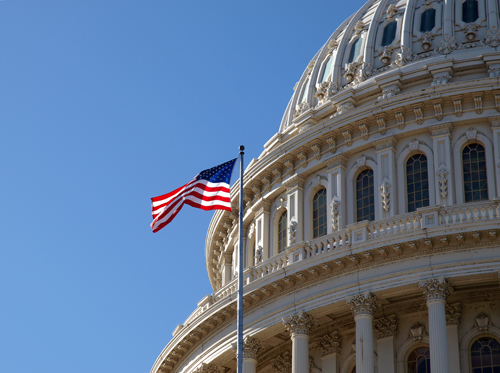
Here is a quick run down of major issues being discussed by policymakers from an endocrine perspective and the Society’s current advocacy work. Let us know if you would like additional information or have any questions.
What’s Happening in Washington
The State of Our Union Is Delayed – As we write this summary, congressional Democrats and President Trump remain in a shutdown standoff. The House passed a new continuing resolution (CR) to fund the government through February 28. The CR did not include border wall funding and consequently will not be taken up by the Senate according to Senate Republican Leader Mitch McConnell (R-KY). House Democrats also managed to pass a spending bill that would reopen and finalize funding for eight of the nine remaining agencies that have not been funded over this year, which also is not moving in the Senate.
In the meantime, President Trump announced that he would deliver the State of the Union (SOTU) as planned on January 29 and Speaker Nancy Pelosi (D-CA) quickly responded that as long as the state of the union is shut down, there will be no SOTU (#NotInMyHouse).
While some may have thought stripping the president of the opportunity to address the nation on network and cable TV would entice him into making a deal, that has not been the case so far. The Washington Post reported that Acting White House Chief of Staff/OMB Director Mick Mulvaney asked federal agencies for a list of the highest-impact programs that will be jeopardized should the shutdown continue into March and April. On January 24, Day 34 of the shutdown, however, there were some glimmers of hope as Senate Democratic leadership started negotiations with President Trump. We can only hope..
The new United States 116th Congress was sworn in on January 3, 2019. A new Congress presents an extraordinary opportunity for you to contact the new members of the Senate and the House of Representatives, offer your expertise as endocrinologists and/or researchers, and share what issues you and the Endocrine Society find important.
Join our campaign and welcome your new member of Congress today!
If you have any trouble navigating our advocacy software, please refer to our Contact Congress guide.
What We Are Working On:
Despite the partial government shutdown, Endocrine Society members and staff have been hard at work advocating for our priorities:
Diabetes
- Insulin for Furloughed Federal Workers – As the government shutdown goes into its second month, there have been numerous stories in the media about furloughed employees going without their medications, including insulin. We worked with our partners in the diabetes community – ADA, JDRF, and Beyond Type 1 — to reach out to Eli Lilly and Company, Novo Nordisk, and Sanofi to see what could be done to ease the burden. Each of these companies are providing outreach to insulin-dependent patients affected by the government shutdown. Read details at www.endocrine.org/shutdown.
- Funding for Diabetes Programs – Congressional Diabetes Caucus Co-Chairs Diana DeGette (D-CO) and Tom Reed (R-NY) are drafting request letter to House appropriators. They will be asking for the $30 million for the National Diabetes Prevention Program (NDPP) and $185 for CDC’s Division of Diabetes Translation that we requested.
- Special Diabetes Program – The Special Diabetes Program (SDP) needs to be reauthorized at the end of this year and so we are working with ADA, JDRF, the National Indian Health Board, and the National Council of Urban Indian Health to advocate for renewal, an extended authorization period (5 years rather than 2), and increases for both the research and Indian health components of the program ($200 million per year each rather than $150 million). We expect legislation to be introduced in March with hearings in the late spring/early summer.
- Legislative Priorities – Endocrine Society staff met with Congressional Diabetes Caucus staff to discuss our diabetes priorities: funding for NDPP, expansion of the Medicare Diabetes Prevention Program including virtual, increasing screening for prediabetes, and diabetes self-management training legislation.
Drug Pricing – We submitted comments on the Administration’s Proposed Rule on Modernizing Part D and Medicare Advantage to Lower Drug Prices and Reduce Out-of-Pocket Expenses. While the proposed rule was broad, we focused our comments on the following specific provisions: The requirement for Part D plans to provide physicians with access to real time benefit tools that provide patient-specific information on formularies, out-of-pocket costs, and lower cost alternatives; including information in the patient’s explanation of benefits on lower cost alternatives and changes in drug prices; and including all pharmacy price concessions (rebates) in the negotiated price to lower out-of-pocket expenses.
Transgender Health – In response to the Supreme Court’s decision to allow the Trump Administration’s restrictions on transgender military personnel to take effect as legal battle continues, we continued to make our experts available to the media and used social media to link to our position statement. and stress that science shows there is no medical reason why transgender individuals cannot serve in the military.
Women’s Health Research – We led an effort to get support for a resolution by Senator Tammy Duckworth (D-IL) and Representative Jan Schakowsky (D-IL-9) to create a “Women’s Health Research Day. Our letters were signed by 29 prominent research and women’s health organizations and can be seen below.


